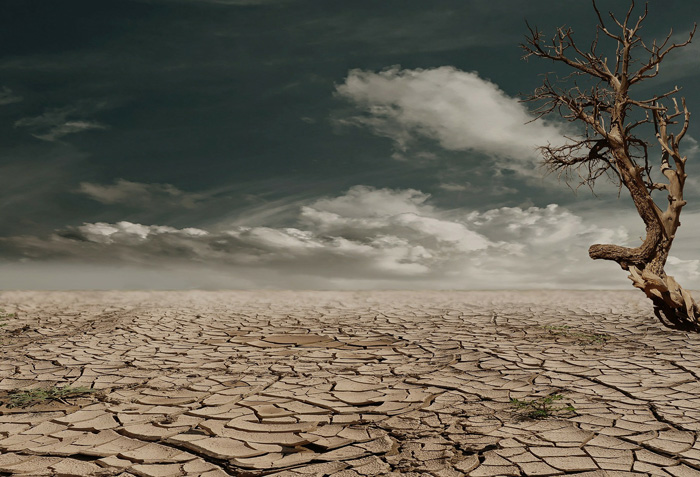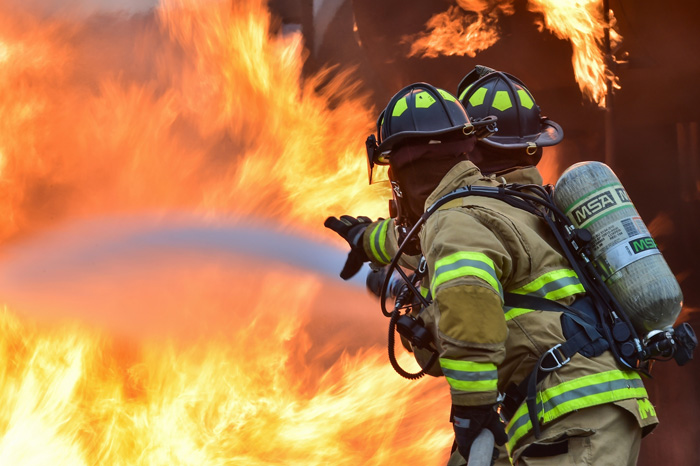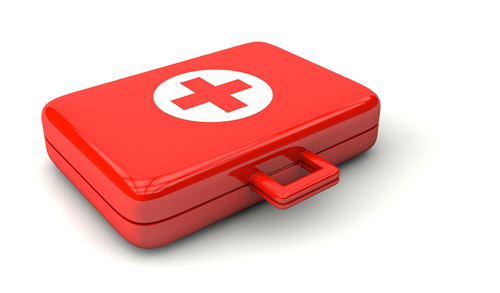
Picture this: you’re asleep in bed at 2:00 in the morning, when you’re startled awake by a crash.
It’s pitch black outside, but in the darkness you can barely make out two men outside, flashlights in hand. They’re banging at your door, and you realize you might be getting robbed.
Your heart is pounding. In all the chaos, and as you wipe your eyes awake, you quickly realize you misjudged the situation. But that doesn’t make your reality any better.
The two men aren’t robbing you. They’re warning you.
There’s a fire spreading throughout the neighborhood. Your house is surrounded by flames, and you need to leave NOW.
This was the situation fellow money blogger Dads, Dollars, and Debts (DDD) found himself in earlier this month.
The Worst Fire in Modern History Hits Close to Home
DDD immediately grabbed his wife, his kids, and a small bag of camping gear and fled for his life.
With all the street lights out and smoke everywhere, he drove in total darkness to seek refuge with a friend. During the drive he dodged jumping flames and glowing red embers, all while hoping he wasn’t heading further into the fire.
He made it safely to his friend’s house, and later that morning he heard the news…
His house was completely burned to the ground. Everything lost. The fire burned so hot that even his fireproof safe melted away.

Unfortunately, his lost house added to this October’s tragic California wildfire statistics:
- Nearly 9,000 structures burned to the ground, including entire neighborhoods and at least 3,000 homes.
- Over 40 lives lost.
- Nearly 100,000 people displaced.
He was left no choice but to start rebuilding…
What would you do if you lost everything?
DDD’s story hit particularly close to home for a few reasons.
From a selfish perspective, I posted earlier this month about my trip to California right in the middle of the fires. And while the biggest inconvenience I had was switching hotels, it’s entirely possible I was snapping pictures of the Golden Gate Bridge while DDD was picking up the pieces of his life.


And as I read DDD’s harrowing account of the evacuation and eventual loss of everything, his post hit me even harder. 2,000 miles away in chilly Minnesota, I was closing on a new house at the same time his was burning to the ground.
We Forget How Lucky We Are
I know it sounds incredibly cliché, but we really don’t stop and count our blessings enough. At least I know I don’t.
Our best day is someone else’s worst day. Our “serious problems” are somebody else’s laughing stock.
Just like money, everything is relative. A poor person in America is a 1 percenter in the world. A bad day at the office is nothing compared to losing your house. Losing your house is nothing compared to losing your life.
It’s all about perspective.
Your Stuff Is Just That
These tragic stories also serve as awful reminders. As much as we want to identify with our stuff, and as much as we want to keep that stuff forever, it’s still just stuff.
Stuff goes away, because it’s not real. It’s a feeble attempt by humans to try to convey an emotion. We feel joy when we buy a new gadget, we feel relaxed when we look at a special painting, we feel rich when we buy something expensive, or we feel loved when we get a gift.
But all the stuff is just the middle man. It’s the humans, and those human connections, that are actually behind those physical facades.
Fresh off a move into a new house, I’m especially reminded of this.
I just spent a week tediously shuffling around my stuff in the back of a moving van. I carefully carried it up stairs and around corners, stressing about whether I was going to accidentally scratch the side of the stuff.
“Oohhh, isn’t this thing cool,” I said as I put some stuff into its final perfect corner. “Remember how much fun it was to buy that?”
And I’m transported back to any number of emotions the stuff is meant to spark.
But I could lose it all tomorrow. As the tragic wildfires show, we all could.
And while I think even the most hardcore minimalists would be upset about losing their prized possessions, we have to take a step back.
Amassing massive collections of stuff is an exercise in futility. It’s a distraction from what’s real.
If we have our health, our people, and our life, then we’re unbelievably fortunate.
Money’s job then, is not to fill our houses with stuff. It’s to buy us the things that really matter – our freedom from jobs we dread, and time with people we care about.
Emergency Essentials – Preparing for the Worst

Of course, that’s not to say money can’t also be used to help prepare for a disaster. We’d all like to think it won’t happen to us, but what if it does?
Putting yourself in a position of financial strength is the best move you can take to prepare for any sort of disaster.
DDD is a personal finance blogger, and thankfully, he’s put himself in a sound financial position. I can’t even imagine the amount of stress those who were already living maxed out before the fires must be experiencing right now.
I’m still not the biggest proponent of huge cash emergency funds, but I do believe that carefully designing your budget with plenty of wiggle room is the best emergency preparedness you can take. Someone with a 50% savings rate and thousands of dollars in index funds will have a much easier time handling life’s curveballs than someone living on the financial edge.
Ask yourself this: if your house burned to the ground tomorrow, and you lost everything, would you be able to float the costs until you resolved the inevitable insurance nightmare?
As I read through DDD’s first hand account and the personal finance community’s amazing response, I also picked up a few other tips. I’ll admit, I’d receive a flunking grade on most of these, so I thought it’d be important to share them here.
1) Consider an evacuation bag
A checkbook, a spare credit card, a few changes of clothes, and a computer backup are the things DDD most regrets leaving.
If you’re especially sentimental, consider putting your irreplaceables, like pictures or photo albums, in a bin near an exit or garage, in case you have to evacuate via car.
2) A fireproof safe is a good idea
…But make sure it’s in a place easy to reach in case of emergency. DDD forgot his, and learned that most fireproof safe’s aren’t all that fireproof. He’s now dealing with the hassle of recovering his important documents, like birth certificates, passports, and car titles.
For maximum document safety, consider a safe deposit box at a local bank.
3) Know how to manually open your garage door
In reading his account, I realized I have no clue how to do this.
In case of emergency, I’d probably wreck my car trying to ram it through the garage door, which would be bad for everybody.
4) Have supplies on hand
Of course, evacuation is just one emergency possibility. You may also have to hunker down, in which case it’s important to have a supply of water, nonperishable food, first aid, medication, and maybe even a generator on hand. We don’t need this turning into an episode of The Walking Dead now…
5) Periodically film a video walk-through of your house
This can act as proof of ownership for the insurance company. On that note, occasionally look over your insurance policy to remind yourself what’s covered and what’s not.
Conclusion – It could happen to you. Be prepared.
Lately, between back to back category 5 hurricanes, flooding, wildfires, and earthquakes in places that have never had earthquakes, it’s like we’re living out The Day After Tomorrow. With all the craziness, it’s never been more important to make sure you’re prepared.
This post is a series within the personal finance community intended to spread the word about disaster preparedness. Check out the other awesome blogs and posts involved:
- DadsDollarsDebt – Tubb’s Fire – A Sudden Evacuation
- Chief Mom Officer – Going Beyond The Emergency Fund-A Harrowing Escape Inspires The Personal Finance Community
- OthalaFehu – Cool As A Cucumber
- The Retirement Manifesto – Am I A Prepper?
- Mrs. Retire to Roots – In Case Of Emergency Follow The Plan
- The Lady In Black – Emergency Preparedness
- The Green Swan – Preparing For The Worst
- Minafi – Minimal Hurricane Preparation
- A Gai Shan Life – Earthquake and disaster preparedness
- The Financial Journeyman – Emergency Preparation: Be Proactive
- John And Jane Doe – Thinking the Worst: Emergency Planning or Fighting the Last War?
- Adventure Rich – Emergency Preparation Up North
- Money Beagle – How Much Would You Replace If You Lost Everything?
- Crispy Doc – Fighting Fire With FI/RE
- She Picks Up Pennies – How Can A Planner Be Unprepared?
- Chronicles Of A Father-Getting Ready for a Natural Disaster
- Rogue Dad MD- Disrupting the Equilibrium
- Unique Gifter-10 Ways To Help Disaster Victims
- SomeRandomGuyOnline-Friday Blog Roundup – Emergency Preparedness Edition
- 99 to 1 Percent: 15 Frugal Ways To Prepare For An Emergency
- I Dream Of FIRE – Your house is burning and you can only save 10 things – what do you choose?
- Full Time Finance – Emergency Preparedness in Place
- Thinking of Someday – Are You Prepared For When An Emergency Occurs?
Related Articles:


Another tip and something we learned dealing with Harvey, is to take photos and videos of all the damage (at every angle). I learned that I didn’t get enough pictures showing the flood line of all of the garage and all the walls. I took a lot of photos when the water receded, which did leave a line, but not good enough. Also, take pictures of the work you are doing and the trash you have accumulated (including anything you lost). Sometimes in disasters, it will take a very long time to get an insurance adjuster out there to inspect. It took our adjusters at least two weeks. And with flooding, you have to get the walls exposed and drying before mold sets in making your already damaged house even worse. So, just document everything with a camera to show the adjusters later.
Thanks for the tips Kristi. Sorry to hear you were impacted by Harvey…
“Amassing massive collections of stuff is an exercise in futility. It’s a distraction from what’s real.”
Thank you for posting this MMW. I’ve been a recent follower of your blog, but nothing hit’s home more than realizing how much stuff we accumulate in our homes (and nothing is more humbling than moving to a new home, because only then does our mindset shift to wanting to get rid of it all). Our world needs to have a gutcheck on what matters most in our society – when our day comes, our materials don’t come with us. Thanks again
“If we have our health, our people, and our life, then we’re unbelievably fortunate.”
So true, Kole. Thanks for reading.
Thanks for posting. Motivates me to check on my bug out bag.
I’ve never been good at keeping enough non perishable food and water around. It always felt wasteful. But we really should make it a rule to at least keep a case of water under the bed.
Same here. I like the water suggestion though. Start with baby steps and work our way up from there.
Good reminders MoneyWiz. I don’t put a huge portion of my net worth into real estate or physical things, so losing a home to fire wouldn’t be financially devastating or anything.
Sure, I’d have to replace a bunch of that *stuff* or deal with insurance companies, but that’s more of an inconvenience than anything.
Still, natural disasters can happen to anybody. It’s best to always be prepared!
Thanks for joining in the chain – it’s great that folks still want to spread the word!
Thanks for setting it up Liz! So cool to see the personal finance community come together to spread an important message.
Good advice. Sorry to say (probably like many of us) I get caught up in the day to day and get bummed out my dumb and irrelevant stuff. Then I read here a family lost their home. We truly do forget how lucky we are in so many ways. Tom